- What is trust and how is it built in teams and organizations?
- What are the major barriers leaders and teams face in building trust?
- How can leaders proactively build trust?
- How can they mend it after a crisis?
Copyright © 2020, Next Decade, Inc.
Archive for the ‘Communications’ Category
Copyright © 2020, Next Decade, Inc.
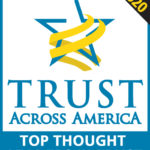 Nominations are now open for Trust Across America-Trust Around the World’s 11th annual Top Thought Leaders in Trust.
Nominations are now open for Trust Across America-Trust Around the World’s 11th annual Top Thought Leaders in Trust.
Announcement of honorees will be made in January 2021 via TRUST! Magazine.
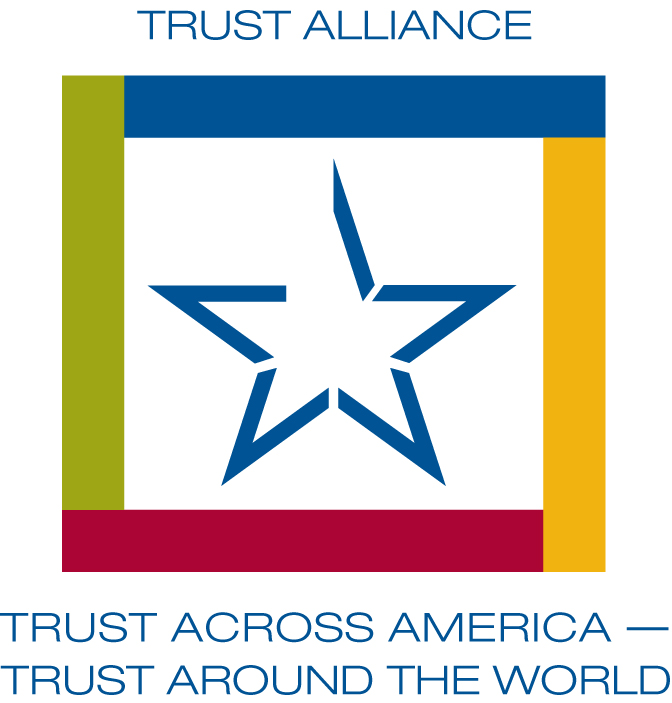 Do you work on a team where both leaders and colleagues hide their true intentions?
Do you work on a team where both leaders and colleagues hide their true intentions?
The outcome of hidden agendas is distrust and inertia, as goals become guesswork and the fear of making a mistake increases.
Last week, as part of our Zoom Lunch & Learn members of our Trust Alliance convened to discuss the topic of team trust, transparency & hidden agendas. We addressed four questions during the hour:
What did our Trust Alliance members have to say about Question #3? How can transparency be elevated within a team?
The following were some of the key take aways:
A final comment:
While courageous and empowered cultures have fewer transparency challenges, transparency alone won’t get a team to the trust “finish line.” In fact, transparency is only 1 of 12 behaviors that elevate trust in teams and organizations. And in the many organizations we have surveyed, transparency is not the #1 cause of low trust. To find out what is, spend 1 minute answering this question and see the results from over 500 respondents.
 “Never ruin an apology with an excuse.” Benjamin Franklin
“Never ruin an apology with an excuse.” Benjamin Franklin
“Say you’re sorry.” As a child, how often did you hear those words from parents and teachers? While apologies become even more “complex” in adulthood, have you stopped to consider the role they play in trust repair? This week, as part of our Zoom Lunch & Learn series seven members of our Trust Alliance convened to discuss the topic of apologies in a session called “I’m sorry…but.”
Our discussion extended beyond apologies at the organizational or corporate level. We reviewed interpersonal apologies as well.
The following are some of the key take aways:
A few additional thoughts the intersection of apologies and trust for leaders and organizations facing a crisis:
Copyright © 2020, Next Decade, Inc.
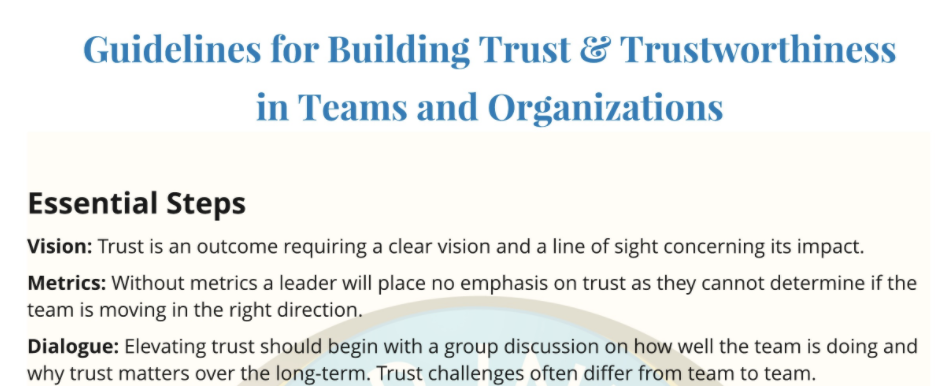 “Trust has to be earned, and should come only after the passage of time.”
“Trust has to be earned, and should come only after the passage of time.”
Performing a quick review of recent news headlines on trust repair and restoration returns the following results:
Restore Trust in Science
Pittsburgh Diocese to do More to Restore Trust
Can a Blockchain Timestamp Help Rebuild Trust
Fair and Unbiased Reporting Will Restore Trust in Media
Mayor Peter Gets Hired by Notre Dame to Restore Trust in Politics
Zuckerberg Has a Lot of Work To do To Restore Public Trust in Facebook
These headlines might lead the average reader to believe that, at one point, the referenced societal institutions had built trust and have now lost it. For others including me, they are a naive attention grabbing media tool, serving no purpose and misleading most readers. It’s simply not possible to rebuild or restore something that was ignored during the organizational construction phase.
Building trust should never be used as a crisis response or news headline following a reputation hit.
Trust doesn’t work that way. It is always proactive, intentional and deliberate and trust is built:
A strong foundation of trust supports an even stronger “trust bank account” and ensures that reputation hits will be minimized and repair will be easy and inexpensive. It also brings many collateral benefits including:
Unfortunately the current global crisis has revealed the level to which most leaders across all societal institutions from science to business, have ignored the organizational risks that their low trust environments have created. Many are now faced with the monumental task of climbing their way out of the “trust repair trap.” While it’s never too late to start building trust, it must begin with leadership acknowledgement that the crisis response strategy to trust does not work. It never did.
Those interested in proactively elevating trust can choose to:
Barbara Brooks Kimmel is the founder of Trust Across America-Trust Around the World, whose mission is to help organizations build trust. Now in its 12th year, the program has developed two proprietary trust-evaluation tools, the latest is AIM Towards Trust. She also runs the world largest global Trust Alliance and is the editor of the award-winning TRUST INC. book series. Kimmel is a former consultant to McKinsey who has worked across multiple industries and with senior leadership. She holds a bachelor’s in international affairs from Lafayette College and an MBA from Baruch.
Copyright © 2020, Next Decade, Inc.
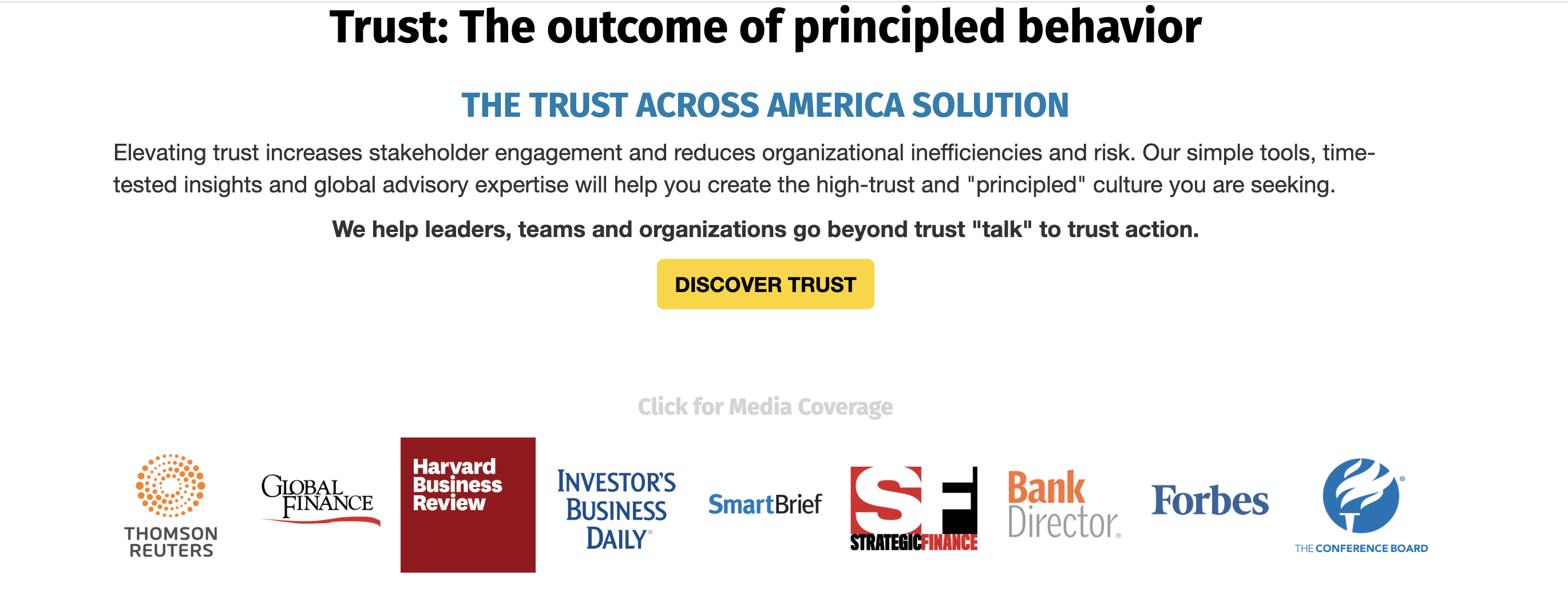 Having studied and observed trust building and trust busting behavior for over ten years, what’s crystal clear is that when people trust you, their confidence in you will increase, and they will be more inclined to do business with you.
Having studied and observed trust building and trust busting behavior for over ten years, what’s crystal clear is that when people trust you, their confidence in you will increase, and they will be more inclined to do business with you.
LinkedIn claims to have more than 700 million users in 200 countries, and the platform can be a very powerful business tool, IF your goal is to build trust with your connections. The following are ten tips on how to do this.
And now for a few surefire ways to bust trust really fast…
Having been an active LinkedIn member for many years, the balance is shifting away from thought leadership towards billboard advertising. If this is accurate, LinkedIn will surely (and quickly) lose its stature as a valuable business tool. In fact, I’ve spent the past several months deleting hundreds of self-promoting LinkedIn connections.
In summary, if the focus is simply “You,” maybe it’s time to rethink your LinkedIn strategy. Start by making “trust building” your core focus.
What other suggestions do you have for building trust on LinkedIn? Leave your comments.
Barbara Brooks Kimmel is the founder of Trust Across America-Trust Around the World, whose mission is to help organizations build trust. Now in its 12th year, the program has developed two proprietary trust-evaluation tools, the latest is AIM Towards Trust. She also runs the world largest global Trust Alliance and is the editor of the award-winning TRUST INC. book series. Kimmel is a former consultant to McKinsey who has worked across multiple industries and with senior leadership. She holds a bachelor’s in international affairs from Lafayette College and an MBA from Baruch.
Copyright 2020 Next Decade, Inc.
PS- Don’t forget to TAP into Trust!
For more information contact barbara@trustacrossamerica.com
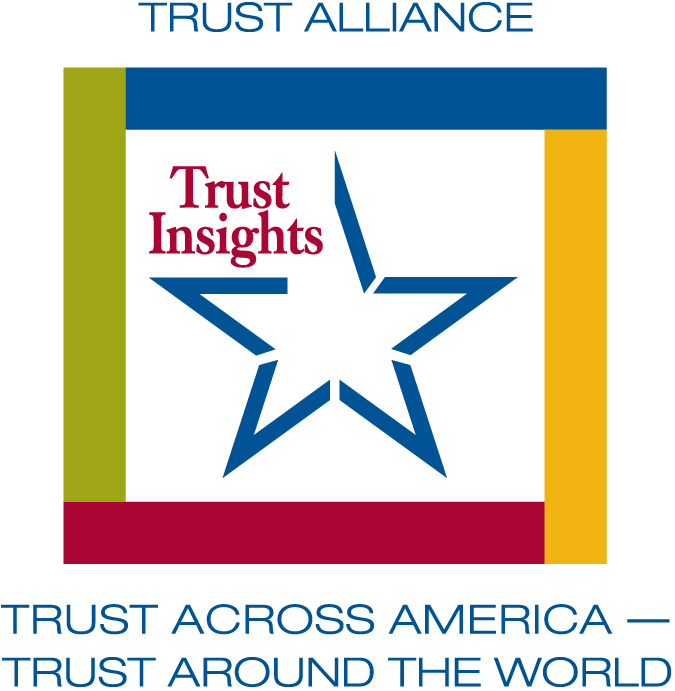 With the right mindset (and tools) leaders can build trust in a new work environment.
With the right mindset (and tools) leaders can build trust in a new work environment.
Barbara Brooks Kimmel
Over the past few months, members of our Trust Alliance have participated in a series of Lunch & Learns. Our global membership crosses every organizational silo and we rarely view organizational trust through the same lens. Sharing our cultural perspectives and trust expertise has elevated our understanding of the nuances of this increasingly relevant and timely topic.
Working from home is just one of many “new” realities facing business leaders during this pandemic. These realities have exposed the lack of leadership acknowledgement of the role trust plays in organizational success. Now more than ever leaders MUST develop intentional trust-building strategies that are internally driven.
So once again, we reached out to our Alliance members, asking for their perspective on the trust challenges leaders should be addressing right now, and any examples of those who are stepping up to meet them.
Leaders Must Extend Trust to their Employees
According to David Belden, one of the most transformational aspects of the pandemic is the transition of the workforce to remote functioning. In working with over 400 companies for the past 22 years, the major hindrance in this transformation has been a lack of trust from leadership towards employees. Companies have traditionally felt that if they could not directly monitor their workforce, the work would not get done.
The current crisis has forced a change in that view. The results have been nothing less than astounding. In recent surveys, over 70% reported that, given the choice, they would continue to work remotely. Concurrently, companies are reporting an unexpected increase in productivity.
There are two critical aspects for a successful transition to remote work:
When these two prerequisites are met, the company has to trust that the employee will fulfill their agreed upon duties. The employee must trust that the company will act in the best interests of all of the stakeholders, particularly the employees. Without mutual trust, this new arrangement will not succeed.
Trustworthiness is a 2-way street with the leader and the team adds Kevin McCarthy. COVID19 is a tough shift in every aspect of our lives and lifestyles. Such times reveal us–particularly our varying personal health conditions, risk profiles and preferences. Leaders who acknowledge and respect these differences may honor them by providing team members, where practical, a transitional period to continue to work from home or return to the workplace as each person sees fit. Likewise, willing, but financially disincentivized, team members drawing unemployment compensation greater than or equal to their pay can do their civic duty by returning to the workforce for the common good of their co-workers, company, and country.
Elevating Trust Requires Acknowledging Uncertainty
Bart Alexander reminds leaders that crises often result in debilitating uncertainty. By saying “It’s too early, we just don’t know,” organizations reinforce collective and individual stress, even panic. Companies can translate uncertainty into manageable risk by openly sharing their best judgement, as in, “This is the worst case, this is the best case, and this is the most likely case, and if anything changes, you’ll be the first to know.” Adding the probability of each scenario will help all to be on the same page and begin to prepare. Open solicitation of ideas on how to best adapt further engages the entire organization into a shared future.
And Lea Brovedani supports these sentiments and provides an example. Leaders should be acknowledging uncertainty and showing their own humanity. They should tell what they know, what they don’t know and still take action. At this time, they need to model the duality of feeling uncertain and showing how to keep moving forward.
The first business leader that comes to mind is Satya Nadella, Microsoft’s chief executive who instructed people to work from home well before most other companies. He acknowledged feeling uncertain and worried, talking about his son who has cerebral palsy and the worries he and his wife have.
Here is a quote from an article written in the Seattle Times:
Nadella gave the interview shortly before releasing a lengthy email to his more than 140,000 employees worldwide, applauding them for their response to the pandemic and urging them to do the best they can to help others on a personal and professional level...
Nadella said in his email that Microsoft is in a position to help slow the pandemic by demonstrating leadership in the face of adversity and maximizing the company’s biggest strength — bringing people, ideas and solutions together quickly through tech. He mentioned the company’s work to bring “trusted news and facts” about COVID-19 to LinkedIn members and on Bing, while working with Facebook, Google and Twitter to bring “authoritative content” to those platforms and “combat fraud and misinformation about the virus.
Trust Will be Predicated on Employee Engagement
Ben Boyd recently wrote an article called “The COVID case for stakeholder capitalism – and the elevated role of corporate communications.” He had this to say about employees and the future of engagement. Employees have shown incredible resiliency, enduring extraordinary and ongoing change. Their continued engagement and commitment are critical to meeting the future needs and demands of the business; however, their expectations have changed over these past four months. Developing programs to engage, motivate, reassure and rebuild an organization’s workforce must be a top priority. Key questions to consider are: How will you address employees’ most basic needs related to personal safety and company hygiene? Moving toward the “next normal,” how will you assess employees’ evolving needs and expectations to ensure your leaders are authentically and empathetically connecting with the workforce?
And finally my thoughts. Business leaders have many tough decisions ahead of them. Hopefully they also have the skill set to engage their employees to help make them. Our current climate of fear has revealed just how much leaders in all societal institutions have taken trust for granted. In business, not only do employees fear for their physical and emotional safety, but also for the future of their jobs. In other words, they don’t trust their employers to keep them safe. Perhaps it’s the emotional element of trust (some call it benevolence) that are even more critical now in allaying those fears. Hard skills like leadership competence are no longer sufficient. In fact, they haven’t ever been. Emotional intelligence, an ethical mindset and empathy are the “soft” skills that build trust. Who returns to work and how to manage social distancing are the easy problems, and the ones that most C-Suite advisors will tackle first. They will also be the ones that are promoted in stakeholder communications. And if the emotional elements that have created the “fear” are not given equal weight, then we will simply return to the pre pandemic levels of low employee engagement and increasingly challenging mental health issues, while sitting six feet apart. Those “hard” decisions are the ones that will continue to separate authentic trustworthy leaders from all others. For the rest, it will be business as “usual” with a few minor and inconvenient adjustments that are the easiest to communicate.
Before you leave, Tap Into Trust and complete our 1 minute/1 question quiz. Find out how the level of trust in your workplace compares to hundreds of others.
Have you reviewed how our workshops are helping teams and organizations just like yours elevate trust? Schedule an ONLINE webinar today.
Did you miss our previous 2020 Trust Insights? Access them at this link.
Contact us for more information on elevating trust on your team or in your organization or email me directly:
Copyright 2020, Next Decade, Inc.
 Leadership ultimately comes down to creating conditions of trust within an organization.
Leadership ultimately comes down to creating conditions of trust within an organization.
Colin Powell
In honor of Memorial Day, this week’s Trust Insight comes courtesy of Colin Powell. During this brief and concise video, Powell discusses the role trust plays in leadership:
Powell’s timeless “rules” of leadership were first printed in the August 13, 1989 issue of Parade magazine and are reproduced below.
13 Rules of Leadership
Please stop by our website for additional organizational trust resources, or schedule a call to learn how we can help elevate trust in your leadership team and among employees in your organization.
Did you know that over 137,000 global professionals have Tapped into Trust? Have you?
Copyright 2020, Next Decade, Inc.
 Robert, thank you for participating in our 2020 Trust Insights series. What is your trust insight?
Robert, thank you for participating in our 2020 Trust Insights series. What is your trust insight?
“Trust is not a message; it’s an outcome – and trust may not even be the real issue.” Robert Phillips
Can you expand a bit on this timely insight?
For way too long, “trust” has been hijacked by communications consultancies and strategy firms, who see/ position the trust “issue” and how to address it as a function of what the organisations says, rather than what it does. They sell strategies and programmes accordingly. Together with reliance on some dodgy data, this leads to a bogus and corrosive narrative around trust: often creating a false sense of (global) crisis. This masks more profound issues and challenges and many cultural and political nuances.
Organisations would do better by focusing on their own behaviours and on the real issues (including the climate emergency and tech disruption) that lead to better outcomes for employees, customers and stakeholders. Furthermore, trustworthiness is a more relevant construct than “trust”. Trustworthiness is a function of Honesty + Competence + Reliability + Good. It is undermined by self-interest, especially where such self-interest is not transparently declared.
Can you provide a real life example of a trust “challenge” where your insight has been effectively applied.
The Global Responsible Tax Project curated by Jericho Chambers for KPMG, has been running since 2014. Based on organising principles of activism, participation, accountability and dissent, it now hosts a community of 1700 experts, built peer-to-peer, from the Global North to Global South and across the political spectrum – including corporate leaders; advisors; politicians and policy-makers; activists, NGOs and campaigners; academics and experts; media and the commentariart. This global coalition has worked together to develop new policy ideas and recommendations – leading to more trust between all parties and better policy outcomes for the common good. It’s starting point was that any solution to global tax problems were better served by addressing the purpose of tax, than communications and lobbying around the issues, and that no-one has all the answers. Tax is trust, write large – as this article brings to life.
Generally, do you think the global “trust” climate is improving or worsening? What actions are making it better or worse?
Many claim we have a crisis of trust. Do you agree?
No, although a recognition of the chronic condition (see above) is important, as is a determination to do something about it.
Robert, thank you so much for your time and more importantly for your commitment to elevating organizational trust. What would you like our audience to know about you?
Robert has been at the forefront of the UK Public Relations industry for three decades. His expert area is the relationship between communications, leadership and trust.
Robert’s 2015 book Trust Me, PR is Dead was heralded by Management Today as “a game-changer for the future of communications”. His often-outspoken views have been described as “essential for anyone who wants to influence and persuade in the mid-21st century”. Since 2014, Robert has helped build coalitions across business, government and civil society on subjects ranging from Responsible Tax to the Future of Work; Adult Social Care to the Future of Transport; Infrastructure and Housing to the Built Environment. Robert advocates new operating principles based on activism, accountability, co-production and dissent.
Robert is Founder of Jericho Chambers and Visiting Professor at Cass Business School, City, University of London. He was formerly CEO, Europe, Middle East & Africa for Edelman – the world’s largest Public Relations firm – and Global Chair of its Future Strategies & Public Engagement Group. He co-founded JCPR in 1987 – described by PR Week as “the seminal consumer brands consultancy of the Nineties and Noughties” – which he sold to Edelman in 2004. Two of Robert’s campaigns, for Wonderbra and PlayStation, were included in the Top 20 PR Campaigns of All Time.
Before you leave, Tap Into Trust and complete our 1 minute/1 question quiz. Find out how the level of trust in your workplace compares to hundreds of others.
Have you reviewed how our workshops are helping teams and organizations just like yours elevate trust? Schedule an ONLINE webinar today.
Did you miss our previous 2020 Trust Insights? Access them at this link.
Contact us for more information on elevating trust on your team or in your organization or email me directly: barbara@trustacrossamerica.com
Copyright 2020, Next Decade, Inc.
 Our new reality is teaching us so much about trust. Barbara Brooks Kimmel
Our new reality is teaching us so much about trust. Barbara Brooks Kimmel
This past Thursday, nine members of our Trust Alliance, from four countries, convened for the first in a series of weekly Zoom “Lunch and Learns.” The discussion topic was Trust Lessons from Coronavirus. The conversation ran the gamut from families to communities, and up the societal ladder to government and beyond.
Let’s begin with trust lessons for the family and work our way up from there.
The Family
The modern family operates differently than it did just a generation ago, when more mothers stayed home with their children. In my research I uncovered the following. As of 2018, 63% of all American families have two working parents. In 1989 the number was 53%. (US Bureau of Labor Statistics.) This represents close to a 19% increase. Suddenly, both parents are home, with many working remotely, and their kids are home too, with no school or childcare options. Certainly a shock and a “new reality” for many families. What does this have to do with trust? Just about everything.
Randy Conley of The Ken Blanchard Companies spoke about benevolence and compassion as not only the launch pad for building greater trust, but as the basis of the human fundamental connection. Working parents may want to consider using this “teaching” moment to build even stronger bonds with their children who will then have an improved “skill set” to build them with their friends, communities, teammates and beyond. Parents may consider taking some of these lessons back to their jobs when they return. This could translate into higher levels of workplace trust and more trustworthy generations in the future.
The Community
At the community level, Lea Brovedani is encouraged by how she sees people connecting, displaying tremendous empathy and generosity towards others by offering to help neighbors, joining together in fundraising for nurses and hospitals, and accepting “distancing” (and even washing hands) in the interests of protecting others. Both empathy and generosity build trust.
Darshan Kulkarni, our resident bioethicist, happens to live across the street from a hospital in a large US city. He is witnessing the virus first hand from his window. He urges everyone in every community to take time to separate fact from fiction to get a better “feel” for what is going on, and lessen fear and panic. Understanding that the political push and pull, and the day to day Fox vs. CNN reporting may hurt trust in the short term, it’s now up to communities to pull together to ensure that trust is not eroded over the long term.
The Workplace
David Belden, an organizational strategy consultant discussed how the coronavirus will permanently change the way we work. He reminded us that in many ways the 2008 financial crisis taught companies how to be more productive with fewer employees. Twelve years later and many people are accustomed to working remotely. Now, even more employees have joined those ranks. Will that continue post Coronavirus crisis? Will employers become more efficient? Will trust flourish as in-person micromanagement is no longer an option? Perhaps output increases when time clocks no longer need to be punched.
Will home based employees be more productive with less rules and restrictions? How about those organizations where remote teams have flourished for many years, using ever improving technology to enhance a new form of “teamwork” and efficiency? Has their forward-thinking strategy built a stronger foundation of trust, and a clear business advantage going forward? Because companies are now being given an opportunity to become even more efficient, will they share their wealth with their employees? This is the perfect time for leaders to demonstrate their support for their workers through their actions, not just their words. Think “Purpose” with a capital “P.”
From Canada, Natalie Doyle Oldfield reminded us of how trust builds business relationships, internally with employees and externally with customers and suppliers. At Trust Across America-Trust Around the World, we call that the trust “bank account.” Whether an entrepreneur, a small business owner or the CEO of a multinational company, the bigger that trust account pre crisis, the more stakeholders will remain loyal during the crisis, and the faster the post crisis recovery will be for business leaders who banked it.
Mark Donohue founder of LifeGuides presented another point of view expressing concerns that working from home will be isolating while social connections disintegrate. He shared that 43% of the US workforce currently works remotely (Gallup). Perhaps the time has come, or is past due, to redesign support systems that not only build trust between employers and employees, but also offer better benefits including counseling services during times of isolation and/or personal crisis.
Government
Our European members weighed in on the role government is playing in building or destroying trust. Olivia Mathijsen, a leadership and business advisor is at ground zero for Coronavirus, working remotely in Milan, Italy. She reminded us that different legislators have contrasting points of view, not all data is created equal, that cost cutting in the health sector has created some of the dissolution of trust, and that some media outlets are fueling mistrust by disseminating misinformation. But she sees a silver lining, and that’s compassion being shown and assistance offered not only between individuals, but also between countries, essential components for building societal trust that will hopefully continue post crisis.
Geert Vermeulen, an ethics and compliance expert reporting in from the Netherlands spoke of the shortages of critical supplies and regulatory constraints that have further taxed the system. But he also sees elevating levels of trust as individuals and companies work together to meet societal needs.
The last few minutes of the conversation turned to the shared GLOBAL level of accountability, empathy, compassion and benevolence that has been so apparent over the past several weeks. If we can maintain these basic human behaviors when the Coronavirus crisis subsides, societal trust will certainly be stronger.
In closing, David Belden pointed out that the Latinized form of the Greek word crisis (krisis) means turning point. Coronavirus is already moving the world in the direction of increasing empathy, compassion and benevolence. And as Mark Donohue concluded, the nature of trust is built on the “golden rule,” perhaps the most important reminder during these challenging times.
An abbreviated version of this article was published earlier this week on SmartBrief.
If you would like to participate in our upcoming “Lunch & Learns” join our Trust Alliance.
Before you leave, Tap Into Trust and complete our 1 minute/1 question quiz. Find out how the level of trust in your workplace compares to hundreds of others.
Have you reviewed how our workshops are helping teams and organizations just like yours elevate trust? Schedule an ONLINE webinar today.
Did you miss our previous 2020 Trust Insights? Access them at this link.
Contact us for more information on elevating trust on your team or in your organization or email me directly: barbara@trustacrossamerica.com
Copyright 2020, Next Decade, Inc.
Recent Comments